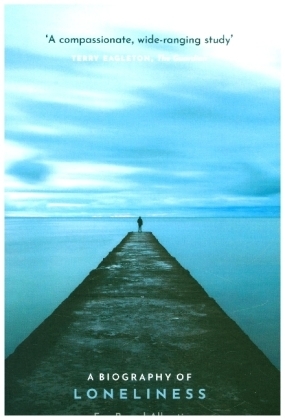
A Biography of Loneliness - The History of an Emotion
| Verlag | Oxford University Press |
| Auflage | 2021 |
| Seiten | 320 |
| Format | 13,5 x 21,6 x 2,4 cm |
| Print PDF | |
| Gewicht | 412 g |
| Artikeltyp | Englisches Buch |
| EAN | 9780198811350 |
| Bestell-Nr | 19881135EA |
Despite 21st-century fears of a modern 'epidemic' of loneliness, its history has been neglected. This is the first book on the history of loneliness to be published in English.
'A compassionate, wide-ranging study.'
Terry Eagleton, The Guardian
Despite 21st-century fears of a modern 'epidemic' of loneliness, its history has been sorely neglected.
A Biography of Loneliness is the first history of its kind to be published in English, offering a radically new interpretation of loneliness as an emotional language and experience. Using letters and diaries, philosophical tracts, political discussions, and medical literature from the eighteenth century to the present, historian of the emotions Fay Bound Alberti argues that loneliness is not an ahistorical, universal phenomenon. It is, in fact, a modern emotion: before 1800, its language did not exist.
As Alberti shows, the birth of loneliness is linked to the development of modernity: the all-encompassing ideology of the individual that has emerged in the mind and physical sciences, in economic structures, in philosophy and politics. While it has a biography of its own, loneliness impa cts on people differently, according to their gender, ethnicity, religion, outlook, and socio-economic position. It is, Alberti argues, not a single state but an 'emotion cluster', composed of a wide variety of responses that include fear, anger, resentment and sorrow. In spite of this, loneliness is not always negative. And it is physical as well as psychological: loneliness is a product of the body as much as the mind.
Looking at informative case studies such as Sylvia Plath, Queen Victoria, and Virginia Woolf, A Biography of Loneliness charts the emergence of loneliness as a modern emotional state. From social media addiction to widowhood, from homelessness to the oldest old, from mall hauls to massages, loneliness appears in all aspects of 21st-century life. Yet we cannot address its meanings, let alone formulate a cure, without attention to its complex, protean history.
Inhaltsverzeichnis:
Acknowledgements
Preface: No (Wo)man is an island
Introduction: Loneliness as a 'modern epidemic'
1: When 'oneliness' became loneliness: the birth of a modern emotion
2: A 'disease of the blood'? The chronic loneliness of Sylvia Plath
3: Loneliness and lack: romantic love, from Wuthering Heights to Twilight
4: Widowhood and loss: from Thomas Turner to the Widow of Windsor
5: Instaglum? Social media and the making of online community
6: A 'ticking timebomb'? Rethinking loneliness in old age
7: Roofless and rootless: no place to call 'home'
8: Feeding the hunger. Materiality and the neglected lonely body
9: Lonely clouds and empty vessels. When loneliness is a gift
Conclusion: reframing loneliness in a neoliberal age
Further reading
Appendix
Rezension:
In addition to Alberti's sharp political analysis, one of the most powerful themes in her book is how varied loneliness is, how embedded it is in our lives, how extensively it evades generalisation. Maybe loneliness is a 21st-century epidemic, a modern illness requiring an urgent response, but its also so much more than that. Sophie McBain, The New Statesman
